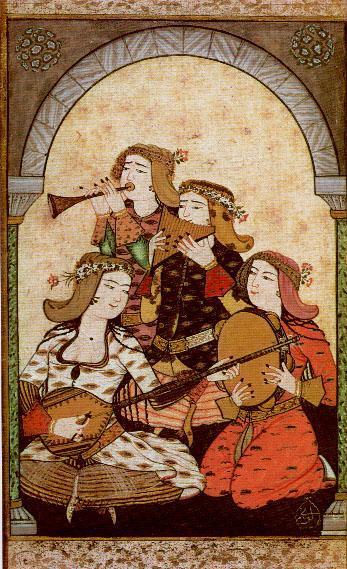|
Sama'i
''Sama'i'' (also known as ''usul semai'') is a vocal piece of Ottoman Turkish music composed in meter. This form and meter ('' usul'' in Turkish) is often confused with the completely different '' saz semaisi'', an instrumental form consisting of three to four sections, in meter, or ''usul aksak semai'' (broken ''semai'' in Turkish). ''Semai'' is one of the most important forms in Ottoman Turkish Sufi music. Sample songs See also *'' Saz semai'' *'' Yürük semai'' *Waltz The waltz ( , meaning "to roll or revolve") is a ballroom dance, ballroom and folk dance, in triple (3/4 time, time), performed primarily in closed position. Along with the ländler and allemande, the waltz was sometimes referred to by the ... * Dede Efendi References * ''The Music of the Ottoman Court'' - Walter Feldman * ''Sufism, Music and Society'' - Swedish Research Institute * ''Makam'' - Karl Signell * ''Meaning in Turkish Musical Culture'' - Eugenia Popescu-Judetz External linksmany pie ... [...More Info...] [...Related Items...] OR: [Wikipedia] [Google] [Baidu] |
Saz Semai
The ''saz semai'' (also spelled in Turkish language, Turkish as ''saz sema'i'', ''saz sema-i'', ''saz sema i'', ''saz semaī'', ''saz semâ'î'', ''sazsemai'', ''saz semaisi'', or ''sazsemaisi'' and in the Arab world as ''samâi'') is an instrumental musical form, form in Ottoman classical music. It was typically the closing movement of a ''fasıl'' (i.e. suite). The saz semai is metered and typically uses the Usul (music), usul (rhythmic structure) called ''aksak semai''. A saz semai is typically in 4 movement (music), movements, called ''hane'' (lit. "house"), each movement followed by a ''teslim'' (refrain). The ''teslim'' and the first three ''hane'' are usually in rhythm structure 10/8, unlike the fourth ''hane'' which is usually in 6/4, 3/4, or 6/8. Common Saz Semaisi Some Saz Semaisi are very well-known and played in the all makam music area (From Greece to Iraq, and from Iraq to Morocco). Here a few of them : *Semâi al Thakil - also called : Arap saz semai. This sama ... [...More Info...] [...Related Items...] OR: [Wikipedia] [Google] [Baidu] |
Waltz
The waltz ( , meaning "to roll or revolve") is a ballroom dance, ballroom and folk dance, in triple (3/4 time, time), performed primarily in closed position. Along with the ländler and allemande, the waltz was sometimes referred to by the generic term German Dance in publications during the late 18th and early 19th centuries. History There are many references to a sliding or gliding dance, including ''volte'', that would evolve into the waltz that date from 16th-century Europe, including the representations of the Printmaking, printmaker Sebald Beham, Hans Sebald Beham. The French philosopher Michel de Montaigne wrote of a dance he saw in 1580 in Augsburg, where the dancers held each other so closely that their faces touched. Kunz Haas (of approximately the same period) wrote, "Now they are dancing the godless ''Weller'' or ''Spinner''."Nettl, Paul. "Birth of the Waltz." In ''Dance Index'' vol 5, no. 9. 1946 New York: Dance Index-Ballet Caravan, Inc. pages 208, 211 "The ... [...More Info...] [...Related Items...] OR: [Wikipedia] [Google] [Baidu] |
Yürük Semai
A ''yürük semai'' (also spelled ''yürük sema'i'', ''yürük sema i'', or ''yürük semâ'î'') is a musical form in Ottoman classical music. It was a movement of a ''fasıl'' (suite). It is generally composed in an '' usul'' (rhythmic structure) of 6/8 or 6/4. Tanburi Cemil Bey was a noted composer of ''yürük semai''. In Arabic music, there is an '' iqa''' (rhythmic mode) called ''yūruk samā'ī'' (يورك سماعي), which is commonly used in the '' muwashshah'' genre. See also *''Saz semai'' *''Sama'i ''Sama'i'' (also known as ''usul semai'') is a vocal piece of Ottoman Turkish music composed in meter. This form and meter ('' usul'' in Turkish) is often confused with the completely different '' saz semaisi'', an instrumental form consisting of ...'' External links''Yürük semai'' page [...More Info...] [...Related Items...] OR: [Wikipedia] [Google] [Baidu] |
Usul (music)
{{more citations needed, date=January 2011 In Ottoman classical music, ''usul'' is an underlying rhythmic cycle that complements the melodic rhythm and sometimes helps shape the overall structure of a composition. An usul can be as short as two beats or as long as 128 beats. Usul is often translated as "meter", but usul and meter are not exactly the same. Both are repeating rhythmic patterns with more or less complex inner structures of beats of differing duration and weight. But a student learning Turkish music in the traditional ''meşk'' system first memorizes the usul kinetically by striking the knees with the hands. The student then sings the vocal or instrumental composition while performing the underlying usul. This pedagogical system helps the student memorize the composition while internalizing the underlying rhythmic structure. Usul patterns have standard pronounceable vocables built from combinations of the syllables ''düm'', ''dü-üm'', ''tek'', ''tekkyaa'', ''teke'' ... [...More Info...] [...Related Items...] OR: [Wikipedia] [Google] [Baidu] |
Music Of Turkey
The roots of traditional music in Turkey span across centuries to a time when the Seljuk Turks migrated to Anatolia and Persia in the 11th century and contains elements of both Turkic and pre-Turkic influences. Much of its modern popular music can trace its roots to the emergence in the early 1930s drive for Westernization. Ashik, Âşık, Aytysh, atışma, singing culture, wedding dance continued way of having fun with family and friends as before. Due to industry music and music in daily life aren't same. Turkish people including new generations have nostalgia music culture., pp 396-410. With the assimilation of immigrants from various regions the diversity of musical genres and musical instrumentation also expanded. Turkey has also seen documented folk music and recorded popular music produced in the ethnic styles of Music of Greece, Greek, Music of Armenia, Armenian, Music of Albania, Albanian, Music of Poland, Polish, Music of Azerbaijan, Azeri and Jewish communities, among ... [...More Info...] [...Related Items...] OR: [Wikipedia] [Google] [Baidu] |
Dede Efendi
DeDe, De De, Dedé or Dédé may refer to: People Nickname or stage name * Dedé (Angolan footballer), born Adérito Waldemar Alves Carvalho * Dedé (footballer, born 1978), Brazilian footballer born Leonardo de Deus Santos * Dedé (footballer, born 1987), Brazilian footballer born Derivaldo Beserra Cavalcante * Dedé (footballer, born 1988), Brazilian footballer born Anderson Vital da Silva * Dedé (footballer, born 2002), Brazilian footballer born Vitor Hugo Oliveira Corrêa da Silva * Dede Allen (1923–2010), American film editor * Dede Barry (born 1972), American cycle racer * Dédé Fortin (1962–2000), Canadian musician * DeDe Lattimore (born 1991), American football player * DeDe Lind (born 1947), American model and ''Playboy'' Playmate of the Month * Denise Lopez (Swedish singer), Mexican-born Swedish singer * De De Pierce (1904–1973), American jazz trumpeter and cornetist * Dede Robertson (1927–2022), Evangelical Christian activist * Dedé Santana (born ... [...More Info...] [...Related Items...] OR: [Wikipedia] [Google] [Baidu] |
Yusuf Nalkesen
Yusuf ( ') is a male name meaning "God increases" (in piety, power and influence).From the Hebrew יהוה להוסיף ''YHWH Lhosif'' meaning "YHWH will increase/add". It is the Arabic equivalent of the Hebrew name Yosef and the English name Joseph. It is widely used in many parts of the world by Arabs of all Abrahamic religions, including Middle Eastern Jews, Arab Christians, and Muslims. It is also transliterated in many ways, including Yousef, Yousif, Youssef, Youssif, Yousuf, Yoosuf and Yusef. Given name Yousaf * Yousaf Ali Khan, British film director *Yousaf Aziz Magsi (1908–1935), Baloch leader from the present-day Balochistan province of Pakistan * Yousaf Borahil Al-Msmare (1866–1931), Libyan Muslim resistance leader fighting against Italian colonization Yossef * Yossef Karami (born 1983), Iranian Taekwondo athlete *Yossef Romano (1940–1972), Libyan-born Israeli weightlifter (also known as Joseph Romano or Yossi Romano), killed in the 1972 Munich massacre Yo ... [...More Info...] [...Related Items...] OR: [Wikipedia] [Google] [Baidu] |
Teoman Alpay
Teoman () is a masculine Turkish given name and a surname that means commander, from the historical leader Touman. Recently, the name Teo has appeared as a nickname of Teoman. Notable people with the name include: Given name * Ali Teoman Germaner (1934–2018) Turkish sculptor * Teoman Koman (c. 1936–2013), Turkish general * Teoman (singer), stage name of Fazlı Teoman Yakupoğlu (born 1967), Turkish acoustic rock singer-songwriter * Teoman Örge (born 1990), Turkish basketball player * Touman (220 B.C. – unknown), earliest known emperor of the Xiongnu Surname * Funda Teoman (born 1984), Turkish pro basketball referee See also * Teoman (wrestler), Turkish-German professional wrestler formerly known as Lucky Kid * Turkish name A Turkish name consists of an ''ad'' or an ''isim'' (given name; plural ''adlar'' and ''isimler'') and a ''soyadı'' or ''soyisim'' (surname). Turkish names exist in a "full name" format. While there is only one ''soyadı'' (surname) in the ful ... [...More Info...] [...Related Items...] OR: [Wikipedia] [Google] [Baidu] |
Taner Şener
Taner (from Turkish ', "dawn", and ', "man") is usually a Turkish masculine given name and surname. It may also refer to Taner, a former imperial Chinese commandery. Given name * Ahmet Taner Kışlalı (1939−1999), political scientist, author and politician * Dany Bahar (born 1971), birth name Taner Bahar, Turkish chief executive * Taner Adu (born 1984), professional basketball player * Taner Akçam (born 1953), Turkish historian, sociologist and author *Taner Akyol (born 1977), Turkish bağlama player and classical music composer * Taner Ari (born 1987), Austrian footballer of Turkish descent * Taner Birsel (born 1959), Turkish film actor * Taner Ceylan (born 1967), German-born Turkish photo-realist artist * Taner Demirbaş (born 1978), Turkish footballer * Taner Gülleri (born 1976), Turkish footballer * Taner Öner (born 1971), Turkish women's football manager *Taner Sağır (born 1985), Turkish weightlifting champion * Taner Savut (1974–2023), Turkish sporting director ... [...More Info...] [...Related Items...] OR: [Wikipedia] [Google] [Baidu] |

